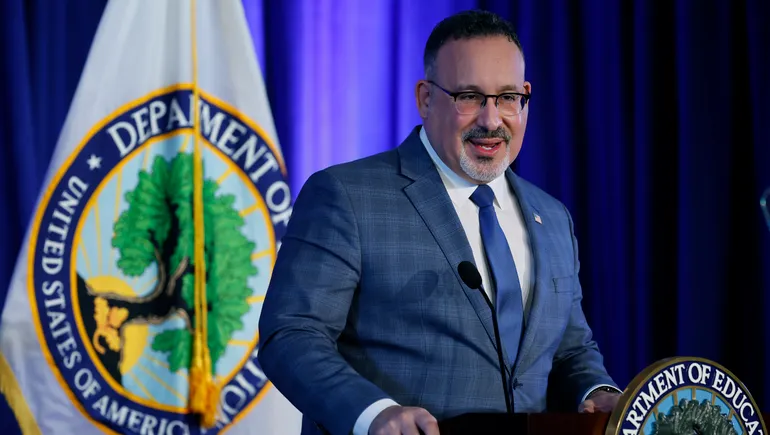Dive Brief:
- Eleven states are suing the U.S. Department of Education and President Joe Biden to stop implementation of the administration’s new income-driven repayment plan, called Saving on a Valuable Education, or SAVE.
- The president and the department do not have the authority to change the terms of loans, the states said in a federal court document filed Thursday. Some of the plaintiffs said they will see a decrease in tax revenue because of the plan.
- The suit is just the latest roadblock to Biden’s student loan agenda. Broad-based debt relief, the marquee item in his plan, has already been scuttled by a 2023 U.S. Supreme Court ruling.
Dive Insight:
The eleven states bringing the suit are Alabama, Alaska, Idaho, Iowa, Kansas, Louisiana, Montana, Nebraska, South Carolina, Texas and Utah. The states are mostly led by Republicans.
A Education Department spokesperson said Friday the agency would not comment on pending litigation.
However, the department said Congress gave the agency the authority to define the terms of income-driven repayment plans in 1993, and the implementation of the SAVE plan is the fourth time it has used that authority.
“The Biden-Harris Administration has been fighting to fix a broken student loan system, and part of that is creating the most affordable student loan repayment plan ever that is lowering monthly payments, protecting millions of borrowers from runaway interest and getting borrowers closer to debt forgiveness faster,” the spokesperson said via email.
Under the SAVE plan, borrowers are required to pay between 5% and 10% of their discretionary income in service of their student loans. But borrowers who make below 225% of the federal poverty line — just under $34,000 for a single person in 2024 — won’t be required to make a monthly payment. And borrowers who owe $12,000 or less will have their loans forgiven if they make payments for about 10 years.
The Higher Education Act gives the department the authority to change the terms of student loans, but the states contend that the SAVE plan actually forgives billions of dollars in student debt “under the guise of modifying the terms of loan repayment.”
The plan effectively makes the loan into a grant, something the Education Department lacks the authority to do, the states argue.
The department is also not permitted to grant this forgiveness without authorization from Congress because it is a matter of “great economic and political significance,” they allege.
In the lawsuit, the suing states that collect income tax argue the rule decreases this source of revenue. The American Rescue Plan stipulated that student loan forgiveness cannot count toward the definition of taxable income until the end of 2025. The states contend that the SAVE plan increases the amount of debt relief students receive before that date, making it untaxable.
The plaintiffs pointed to comments from a department spokesperson, who said that borrowers in Kansas had already seen nearly $10 million in debt relief under the SAVE plan. They allege that Kansas cannot collect income tax on this amount, when it otherwise would have been able to if those loans were forgiven in 2026 or later.
The rule creating SAVE is also “arbitrary and capricious,” plaintiffs allege, arguing that it fails to account for the full cost of the plan.
Earlier this week, U.S. Senate Democrats introduced legislation that would codify the SAVE plan into law. Lawmakers said the bill would help protect the SAVE plan from being rolled back under future administrations.
“I’ve long pushed for better income-based repayment programs because we must do all we can to address America’s student debt crisis,” said Oregon Sen. Jeff Merkley, adding that the act would ensure “student borrowers will have a much-needed path to loan forgiveness for years to come.”
#states #sue #stop #Bidens #incomedriven #repayment #plan








